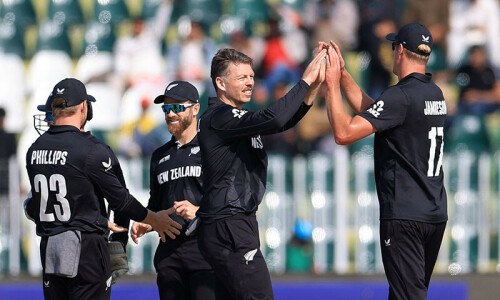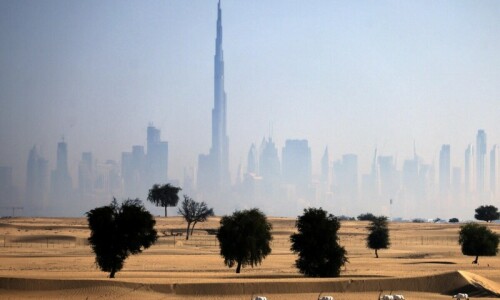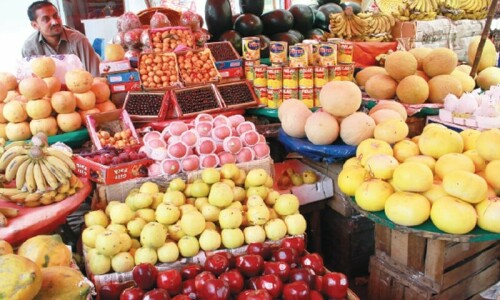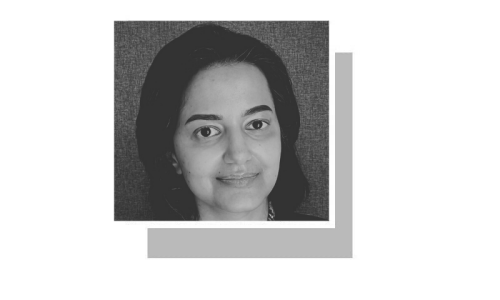BEIJING, Nov 20: US President George W. Bush pressed President Hu Jintao on Sunday to rein in China’s swelling trade surplus and push forward currency reform after calling for greater religious freedom.
But there were few signs that China had offered any major concessions after talks in the Great Hall of the People on Tiananmen Square, with Hu retracing old steps with statements on willingness to cooperate further on the currency and trade.
One positive move on trade was an agreement by China to buy 70 Boeing 737s in a deal worth $4 billion. The near-perennial US trade deficit with China, a lightning rod for criticism in the US Congress, could top $200 billion this year.
At a joint news conference after their talks, Hu said he and Bush had expressed a willingness to ‘join hands together’ to achieve more equitable trade and China would press ahead with the reform of its yuan currency.
Mr Hu, who accepted an invitation to visit Washington, most likely in the spring, also pledged China’s cooperation in fighting the widespread piracy of American goods ranging from music and films to birth control pills and brake pads, which costs US manufacturers billions in lost sales each year.
Continuing a theme of his four-country Asia tour, Mr Bush said it was important that social, political and religious freedoms grow in China.
To underscore this, the US president attended a Sunday service at Gangwashi Church, one of five officially recognized Protestant churches in the capital.
Security officials cordoned off an area of several hundred metres around the church in western Beijing, which was heavily guarded by police in riot gear and plain clothes as groups of bemused locals stood around waiting for the president to pass by.
“May God bless the Christians of China,” he wrote in the church guest book. His wife, Laura, added: “With love and respect.” The pastor gave them Chinese Bibles. US officials were concerned when a Chinese court recently sentenced a Protestant minister, his wife and her brother to prison terms of up to three years for illegally printing Bibles and other Christian publications.
“My hope is that the government of China will not fear Christians who gather to worship openly,” Bush told reporters.
“A healthy society is a society that welcomes all faiths.”
Before coming to Beijing, Bush urged China to make political reforms, holding up its political rival Taiwan, which Beijing regards as part of China, as an example of a model democracy.
China has played down Bush’s comments. Hu said he had told Bush of “China’s unswerving commitment to a road of peaceful development and China’s development in terms of democratic politics and human rights”.
China has about 80 million Christians and allows worship in officially sanctioned churches. But tens of millions attend underground churches that refuse to accept state authority.
Hu also told Bush he was committed to peace and stability in the Taiwan strait and would do his utmost to strive for peaceful unification.
“This being said, we will by no means tolerate so-called Taiwan independence,” Hu said.
Bush faces rising concern among US politicians and manufacturers about the cheap yuan currency, and the president said Washington and Beijing would cooperate in making the yuan’s exchange rate more responsive to market-driven forces.
Hu said China would ‘unswervingly’ press ahead with reform of the yuan, but offered no specific measures or timetable.
A senior administration official told reporters Hu’s tone appeared more positive about currency reform, and offered a sense that China was taking US concerns about infringement of intellectual property rights seriously.
MILITARY BUILD-UP: US Secretary of State Condoleezza Rice voiced concern on Sunday over China’s military build-up, saying that the United States hoped to keep a balance in the region.
Meanwhile, Chinese President Hu Jintao sought to reassure visiting President George W. Bush that China’s rise would be peaceful.
“There’s a question of intent,” Rice told reporters, referring to the modernization of the 2.5-million-strong People’s Liberation Army — the world’s biggest fighting force.
China’s assertion that its intention was peaceful was ‘a very good thing’, Rice said.
“But obviously both in terms of our own military presence and forces, we expect that we will be able to keep a balance in this region,” she said without elaborating.—Reuters















































